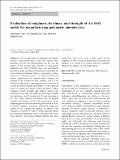Evaluation of roughness, hardness, and strength of AA 6061 molds for manufacturing polymeric microdevices
Author(s)
Tan, Ming-Jen; Tran, Nhat Khoa; Lam, Yee Choeng; Yue, Chee Yoon
Download170_2011_Article_3673.pdf (470.5Kb)
PUBLISHER_POLICY
Publisher Policy
Article is made available in accordance with the publisher's policy and may be subject to US copyright law. Please refer to the publisher's site for terms of use.
Terms of use
Metadata
Show full item recordAbstract
In the manufacturing of polymeric microfluidic devices, micro-molds play a key role because they determine not only the manufacturing cost but also the quality of the molded parts. Recently, a high-quality aluminum alloy 6061 (AA6061) mold with fine features less than its grain size has been fabricated economically by a hot embossing technique. However, temperature cycling during hot embossing process in mold manufacturing reduces significantly the original tensile strength and hardness of the AA6061-T6 alloy substrate, which is not desirable. In this study, a tempering process is carried out to recover the tensile strength and hardness of the embossed mold. To evaluate the changes of these properties, surface roughness, tensile strength, and hardness values were measured in each stage: (1) before hot embossing, (2) after hot embossing, and (3) tempering to T4 and tempering to T6. The results obtained demonstrate that the original strengths and hardness can be fully recovered by a post-tempering process after hot embossing, but with an increase in surface roughness. Moreover, accelerated testing was carried out to evaluate the changes in hardness and roughness of AA6061-T4 and T6 molds under the typical hot embossing temperature cycles of manufacturing polymeric devices. The results obtained indicate that these temperature cycles have only a minor effect on the roughness of both T4 and T6 molds and will increase the hardness of T4 molds to T6 temper, and have negligible effect on the hardness of a T6 temper mold.
Date issued
2011-10Department
Massachusetts Institute of Technology. Department of Mechanical EngineeringJournal
International Journal of Advanced Manufacturing Technology
Publisher
Springer-Verlag
Citation
Tran, Nhat Khoa, Yee Cheong Lam, Chee Yoon Yue, and Ming-Jen Tan. “Evaluation of Roughness, Hardness, and Strength of AA 6061 Molds for Manufacturing Polymeric Microdevices.” Int J Adv Manuf Technol 60, no. 9–12 (October 13, 2011): 1215–1221.
Version: Author's final manuscript
ISSN
0268-3768
1433-3015